BUGEN5930: Business, Society, Planet - TESCO & Woolworths Report
VerifiedAdded on 2023/01/19
|8
|2036
|44
Report
AI Summary
This report provides a comparative analysis of the sustainability initiatives of two major retail companies, TESCO and Woolworths. It begins with an introduction to the importance of sustainability in business and then delves into the specific CSR approaches of both companies, examining their core values and the context of their operations in the UK and Australia, respectively. The report highlights the similarities and differences in their corporate social reports, focusing on areas such as human rights, environmental protection, and food waste reduction. It identifies the most appropriate sustainable development goals (SDGs) for each company, particularly emphasizing the goal of reducing food waste. Furthermore, the report evaluates the sustainability phase to which each company belongs, based on a model by Dunphy, Griffiths, and Benn. Finally, the report assesses the extent to which the companies' social reports reflect their stated values and concludes with reflective insights gained from team engagement in the research process. The report uses various references to support the analysis and findings.
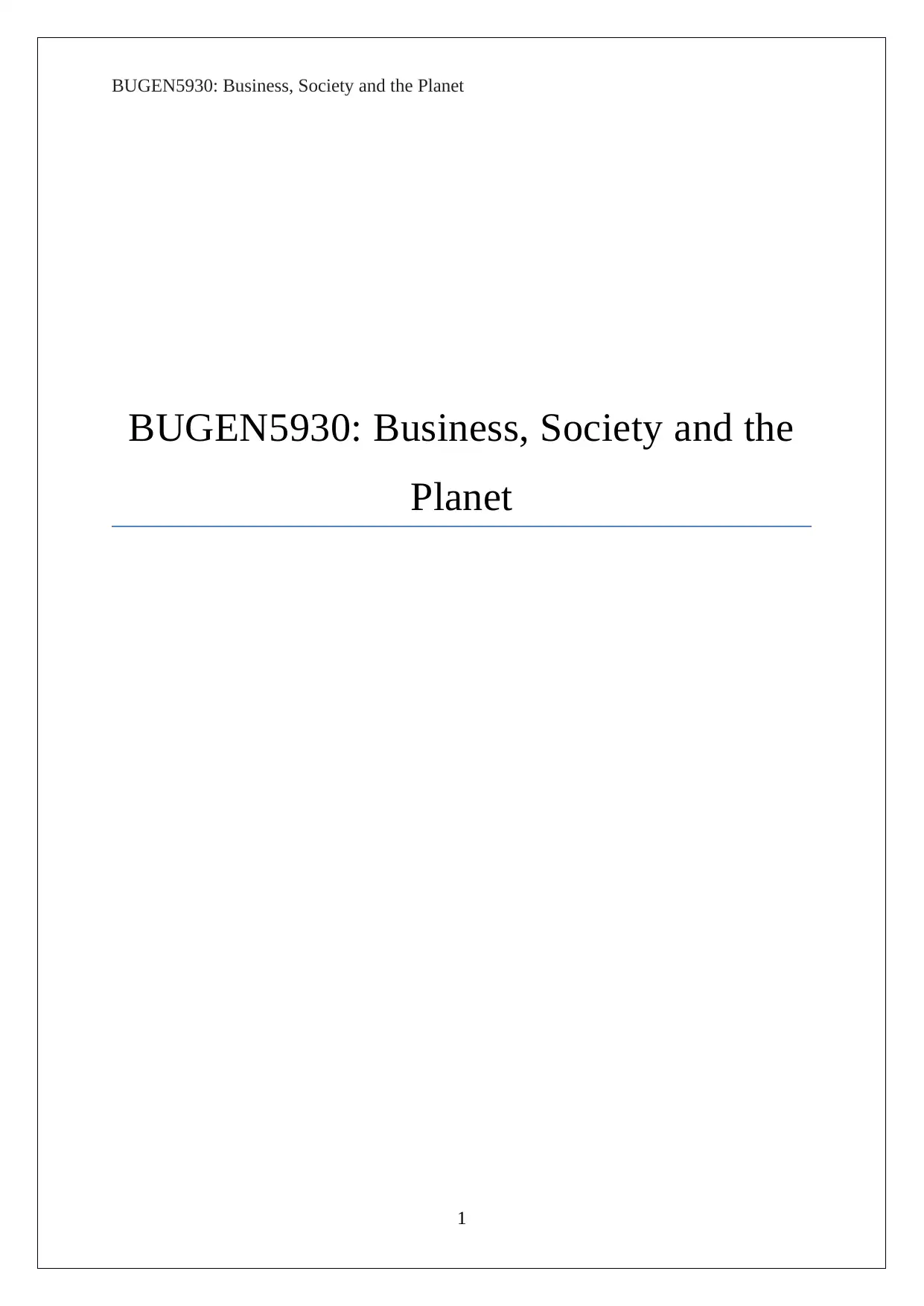
BUGEN5930: Business, Society and the Planet
BUGEN5930: Business, Society and the
Planet
1
BUGEN5930: Business, Society and the
Planet
1
Paraphrase This Document
Need a fresh take? Get an instant paraphrase of this document with our AI Paraphraser
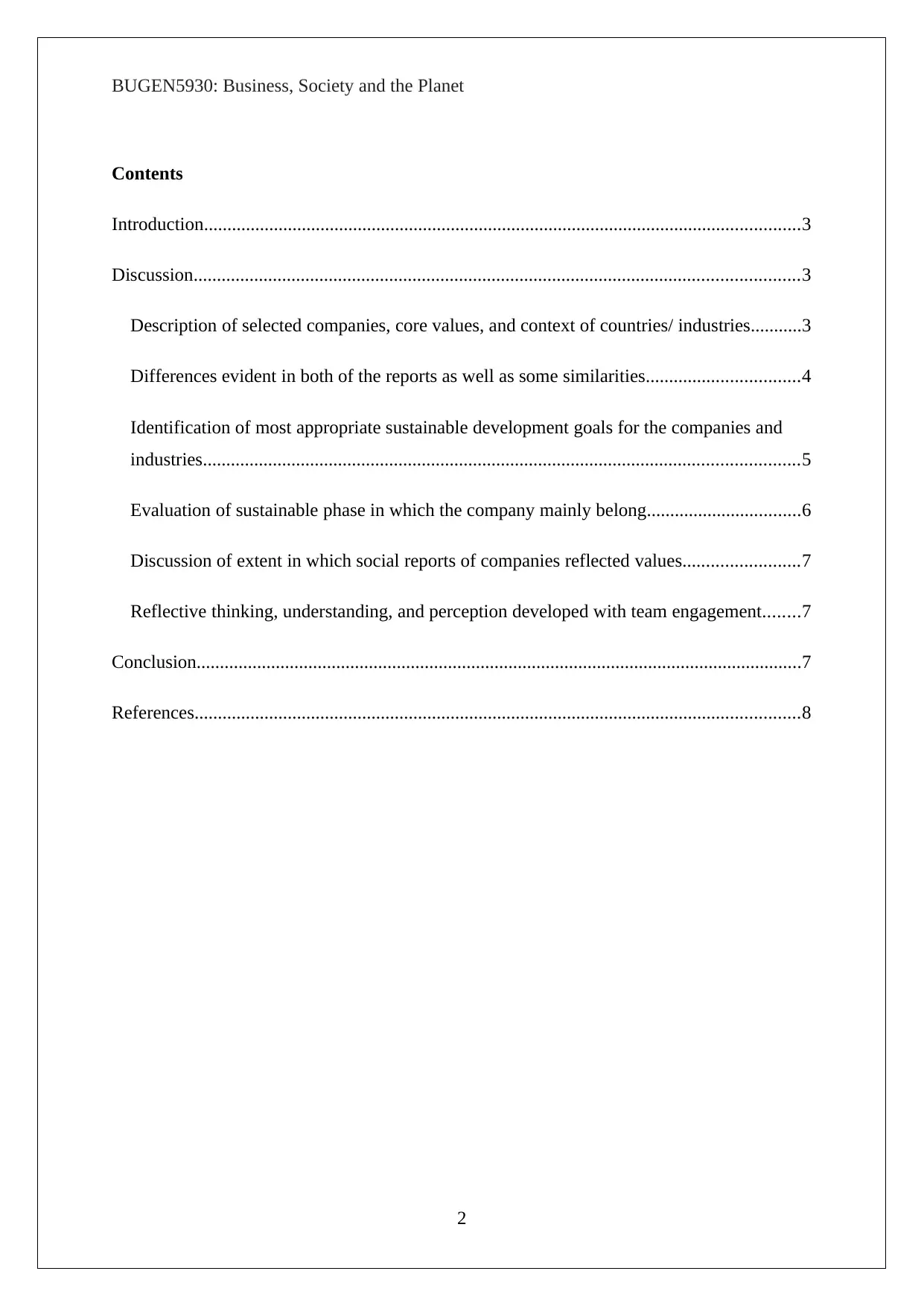
BUGEN5930: Business, Society and the Planet
Contents
Introduction................................................................................................................................3
Discussion..................................................................................................................................3
Description of selected companies, core values, and context of countries/ industries...........3
Differences evident in both of the reports as well as some similarities.................................4
Identification of most appropriate sustainable development goals for the companies and
industries................................................................................................................................5
Evaluation of sustainable phase in which the company mainly belong.................................6
Discussion of extent in which social reports of companies reflected values.........................7
Reflective thinking, understanding, and perception developed with team engagement........7
Conclusion..................................................................................................................................7
References..................................................................................................................................8
2
Contents
Introduction................................................................................................................................3
Discussion..................................................................................................................................3
Description of selected companies, core values, and context of countries/ industries...........3
Differences evident in both of the reports as well as some similarities.................................4
Identification of most appropriate sustainable development goals for the companies and
industries................................................................................................................................5
Evaluation of sustainable phase in which the company mainly belong.................................6
Discussion of extent in which social reports of companies reflected values.........................7
Reflective thinking, understanding, and perception developed with team engagement........7
Conclusion..................................................................................................................................7
References..................................................................................................................................8
2
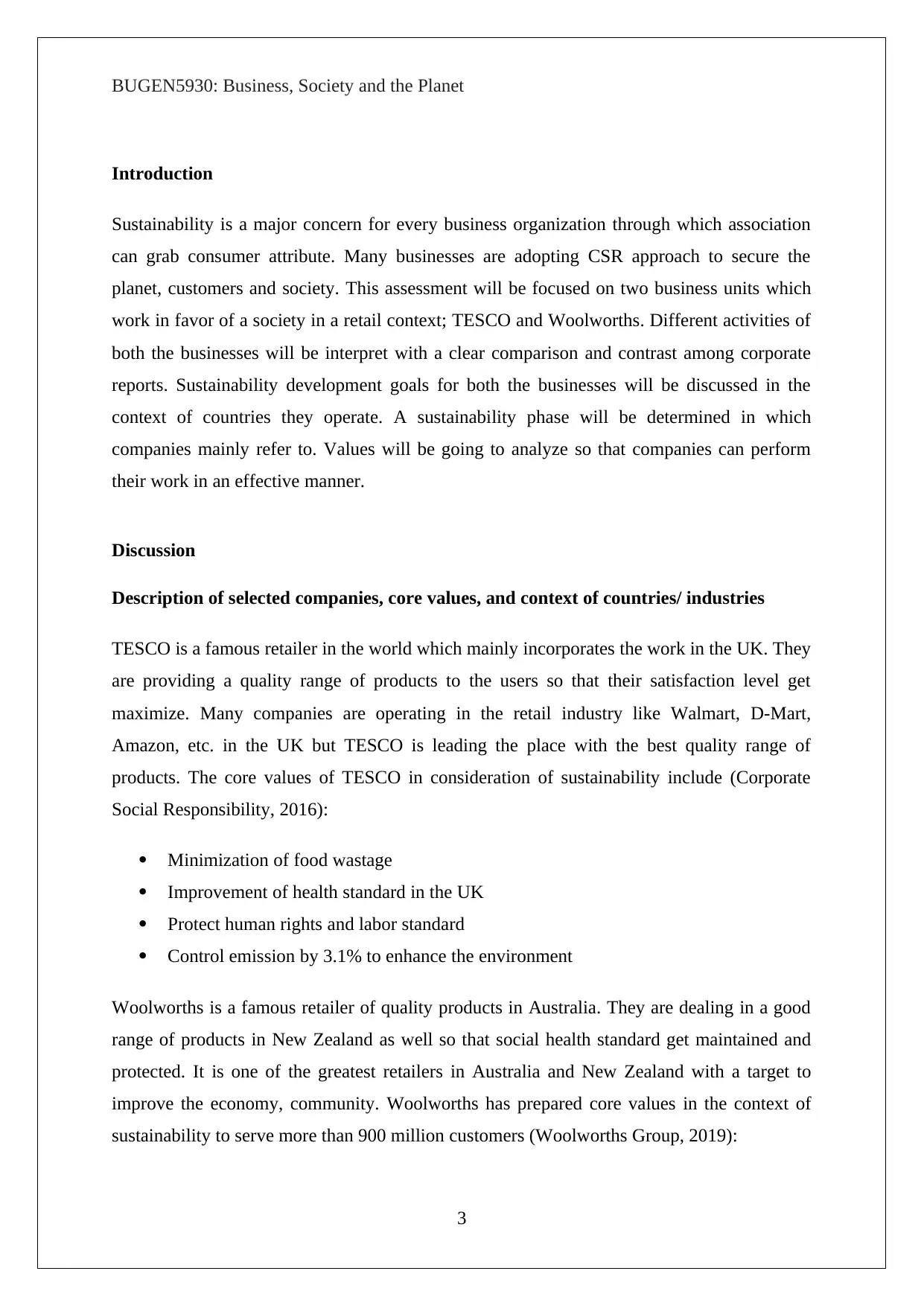
BUGEN5930: Business, Society and the Planet
Introduction
Sustainability is a major concern for every business organization through which association
can grab consumer attribute. Many businesses are adopting CSR approach to secure the
planet, customers and society. This assessment will be focused on two business units which
work in favor of a society in a retail context; TESCO and Woolworths. Different activities of
both the businesses will be interpret with a clear comparison and contrast among corporate
reports. Sustainability development goals for both the businesses will be discussed in the
context of countries they operate. A sustainability phase will be determined in which
companies mainly refer to. Values will be going to analyze so that companies can perform
their work in an effective manner.
Discussion
Description of selected companies, core values, and context of countries/ industries
TESCO is a famous retailer in the world which mainly incorporates the work in the UK. They
are providing a quality range of products to the users so that their satisfaction level get
maximize. Many companies are operating in the retail industry like Walmart, D-Mart,
Amazon, etc. in the UK but TESCO is leading the place with the best quality range of
products. The core values of TESCO in consideration of sustainability include (Corporate
Social Responsibility, 2016):
Minimization of food wastage
Improvement of health standard in the UK
Protect human rights and labor standard
Control emission by 3.1% to enhance the environment
Woolworths is a famous retailer of quality products in Australia. They are dealing in a good
range of products in New Zealand as well so that social health standard get maintained and
protected. It is one of the greatest retailers in Australia and New Zealand with a target to
improve the economy, community. Woolworths has prepared core values in the context of
sustainability to serve more than 900 million customers (Woolworths Group, 2019):
3
Introduction
Sustainability is a major concern for every business organization through which association
can grab consumer attribute. Many businesses are adopting CSR approach to secure the
planet, customers and society. This assessment will be focused on two business units which
work in favor of a society in a retail context; TESCO and Woolworths. Different activities of
both the businesses will be interpret with a clear comparison and contrast among corporate
reports. Sustainability development goals for both the businesses will be discussed in the
context of countries they operate. A sustainability phase will be determined in which
companies mainly refer to. Values will be going to analyze so that companies can perform
their work in an effective manner.
Discussion
Description of selected companies, core values, and context of countries/ industries
TESCO is a famous retailer in the world which mainly incorporates the work in the UK. They
are providing a quality range of products to the users so that their satisfaction level get
maximize. Many companies are operating in the retail industry like Walmart, D-Mart,
Amazon, etc. in the UK but TESCO is leading the place with the best quality range of
products. The core values of TESCO in consideration of sustainability include (Corporate
Social Responsibility, 2016):
Minimization of food wastage
Improvement of health standard in the UK
Protect human rights and labor standard
Control emission by 3.1% to enhance the environment
Woolworths is a famous retailer of quality products in Australia. They are dealing in a good
range of products in New Zealand as well so that social health standard get maintained and
protected. It is one of the greatest retailers in Australia and New Zealand with a target to
improve the economy, community. Woolworths has prepared core values in the context of
sustainability to serve more than 900 million customers (Woolworths Group, 2019):
3
⊘ This is a preview!⊘
Do you want full access?
Subscribe today to unlock all pages.

Trusted by 1+ million students worldwide
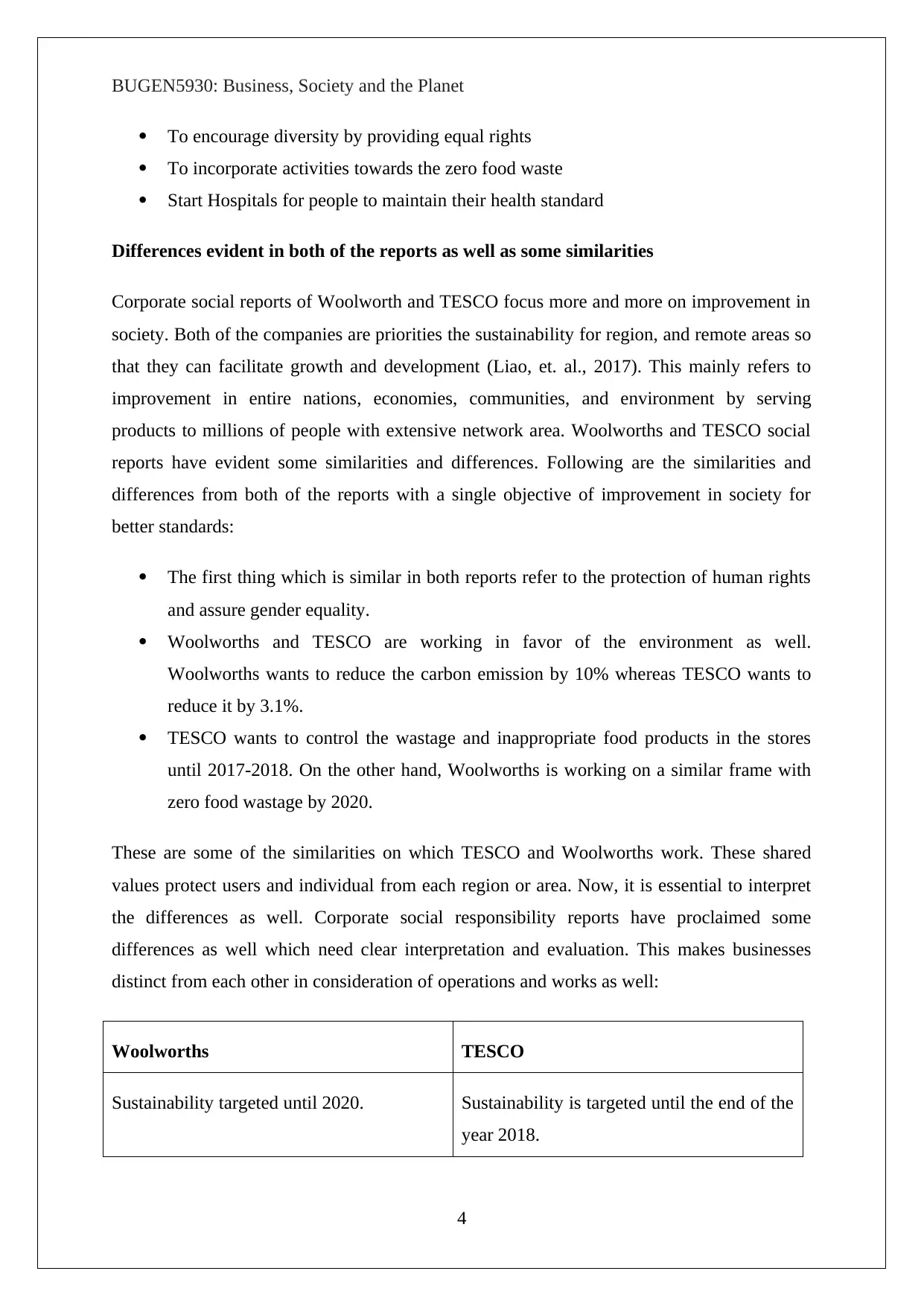
BUGEN5930: Business, Society and the Planet
To encourage diversity by providing equal rights
To incorporate activities towards the zero food waste
Start Hospitals for people to maintain their health standard
Differences evident in both of the reports as well as some similarities
Corporate social reports of Woolworth and TESCO focus more and more on improvement in
society. Both of the companies are priorities the sustainability for region, and remote areas so
that they can facilitate growth and development (Liao, et. al., 2017). This mainly refers to
improvement in entire nations, economies, communities, and environment by serving
products to millions of people with extensive network area. Woolworths and TESCO social
reports have evident some similarities and differences. Following are the similarities and
differences from both of the reports with a single objective of improvement in society for
better standards:
The first thing which is similar in both reports refer to the protection of human rights
and assure gender equality.
Woolworths and TESCO are working in favor of the environment as well.
Woolworths wants to reduce the carbon emission by 10% whereas TESCO wants to
reduce it by 3.1%.
TESCO wants to control the wastage and inappropriate food products in the stores
until 2017-2018. On the other hand, Woolworths is working on a similar frame with
zero food wastage by 2020.
These are some of the similarities on which TESCO and Woolworths work. These shared
values protect users and individual from each region or area. Now, it is essential to interpret
the differences as well. Corporate social responsibility reports have proclaimed some
differences as well which need clear interpretation and evaluation. This makes businesses
distinct from each other in consideration of operations and works as well:
Woolworths TESCO
Sustainability targeted until 2020. Sustainability is targeted until the end of the
year 2018.
4
To encourage diversity by providing equal rights
To incorporate activities towards the zero food waste
Start Hospitals for people to maintain their health standard
Differences evident in both of the reports as well as some similarities
Corporate social reports of Woolworth and TESCO focus more and more on improvement in
society. Both of the companies are priorities the sustainability for region, and remote areas so
that they can facilitate growth and development (Liao, et. al., 2017). This mainly refers to
improvement in entire nations, economies, communities, and environment by serving
products to millions of people with extensive network area. Woolworths and TESCO social
reports have evident some similarities and differences. Following are the similarities and
differences from both of the reports with a single objective of improvement in society for
better standards:
The first thing which is similar in both reports refer to the protection of human rights
and assure gender equality.
Woolworths and TESCO are working in favor of the environment as well.
Woolworths wants to reduce the carbon emission by 10% whereas TESCO wants to
reduce it by 3.1%.
TESCO wants to control the wastage and inappropriate food products in the stores
until 2017-2018. On the other hand, Woolworths is working on a similar frame with
zero food wastage by 2020.
These are some of the similarities on which TESCO and Woolworths work. These shared
values protect users and individual from each region or area. Now, it is essential to interpret
the differences as well. Corporate social responsibility reports have proclaimed some
differences as well which need clear interpretation and evaluation. This makes businesses
distinct from each other in consideration of operations and works as well:
Woolworths TESCO
Sustainability targeted until 2020. Sustainability is targeted until the end of the
year 2018.
4
Paraphrase This Document
Need a fresh take? Get an instant paraphrase of this document with our AI Paraphraser
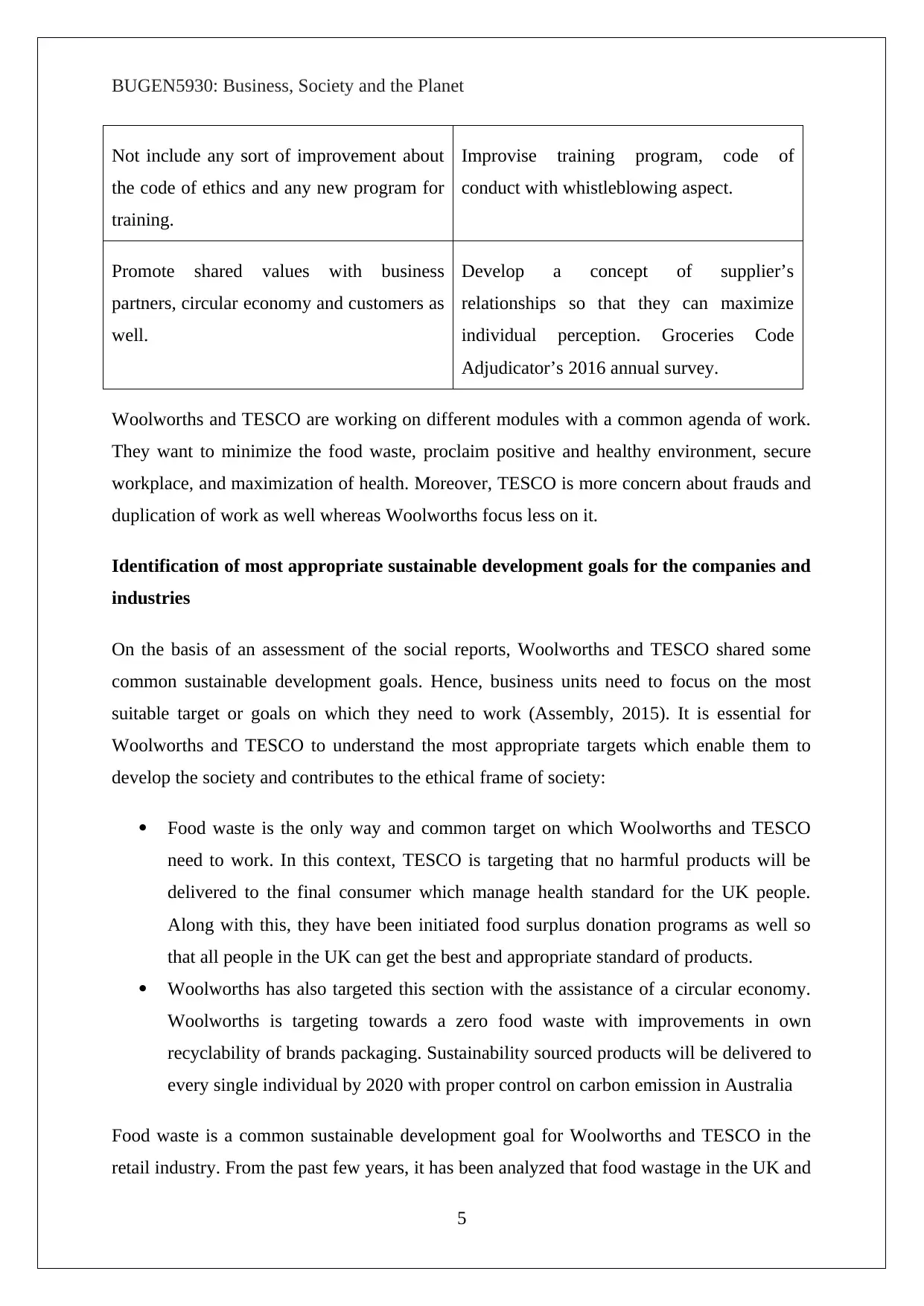
BUGEN5930: Business, Society and the Planet
Not include any sort of improvement about
the code of ethics and any new program for
training.
Improvise training program, code of
conduct with whistleblowing aspect.
Promote shared values with business
partners, circular economy and customers as
well.
Develop a concept of supplier’s
relationships so that they can maximize
individual perception. Groceries Code
Adjudicator’s 2016 annual survey.
Woolworths and TESCO are working on different modules with a common agenda of work.
They want to minimize the food waste, proclaim positive and healthy environment, secure
workplace, and maximization of health. Moreover, TESCO is more concern about frauds and
duplication of work as well whereas Woolworths focus less on it.
Identification of most appropriate sustainable development goals for the companies and
industries
On the basis of an assessment of the social reports, Woolworths and TESCO shared some
common sustainable development goals. Hence, business units need to focus on the most
suitable target or goals on which they need to work (Assembly, 2015). It is essential for
Woolworths and TESCO to understand the most appropriate targets which enable them to
develop the society and contributes to the ethical frame of society:
Food waste is the only way and common target on which Woolworths and TESCO
need to work. In this context, TESCO is targeting that no harmful products will be
delivered to the final consumer which manage health standard for the UK people.
Along with this, they have been initiated food surplus donation programs as well so
that all people in the UK can get the best and appropriate standard of products.
Woolworths has also targeted this section with the assistance of a circular economy.
Woolworths is targeting towards a zero food waste with improvements in own
recyclability of brands packaging. Sustainability sourced products will be delivered to
every single individual by 2020 with proper control on carbon emission in Australia
Food waste is a common sustainable development goal for Woolworths and TESCO in the
retail industry. From the past few years, it has been analyzed that food wastage in the UK and
5
Not include any sort of improvement about
the code of ethics and any new program for
training.
Improvise training program, code of
conduct with whistleblowing aspect.
Promote shared values with business
partners, circular economy and customers as
well.
Develop a concept of supplier’s
relationships so that they can maximize
individual perception. Groceries Code
Adjudicator’s 2016 annual survey.
Woolworths and TESCO are working on different modules with a common agenda of work.
They want to minimize the food waste, proclaim positive and healthy environment, secure
workplace, and maximization of health. Moreover, TESCO is more concern about frauds and
duplication of work as well whereas Woolworths focus less on it.
Identification of most appropriate sustainable development goals for the companies and
industries
On the basis of an assessment of the social reports, Woolworths and TESCO shared some
common sustainable development goals. Hence, business units need to focus on the most
suitable target or goals on which they need to work (Assembly, 2015). It is essential for
Woolworths and TESCO to understand the most appropriate targets which enable them to
develop the society and contributes to the ethical frame of society:
Food waste is the only way and common target on which Woolworths and TESCO
need to work. In this context, TESCO is targeting that no harmful products will be
delivered to the final consumer which manage health standard for the UK people.
Along with this, they have been initiated food surplus donation programs as well so
that all people in the UK can get the best and appropriate standard of products.
Woolworths has also targeted this section with the assistance of a circular economy.
Woolworths is targeting towards a zero food waste with improvements in own
recyclability of brands packaging. Sustainability sourced products will be delivered to
every single individual by 2020 with proper control on carbon emission in Australia
Food waste is a common sustainable development goal for Woolworths and TESCO in the
retail industry. From the past few years, it has been analyzed that food wastage in the UK and
5
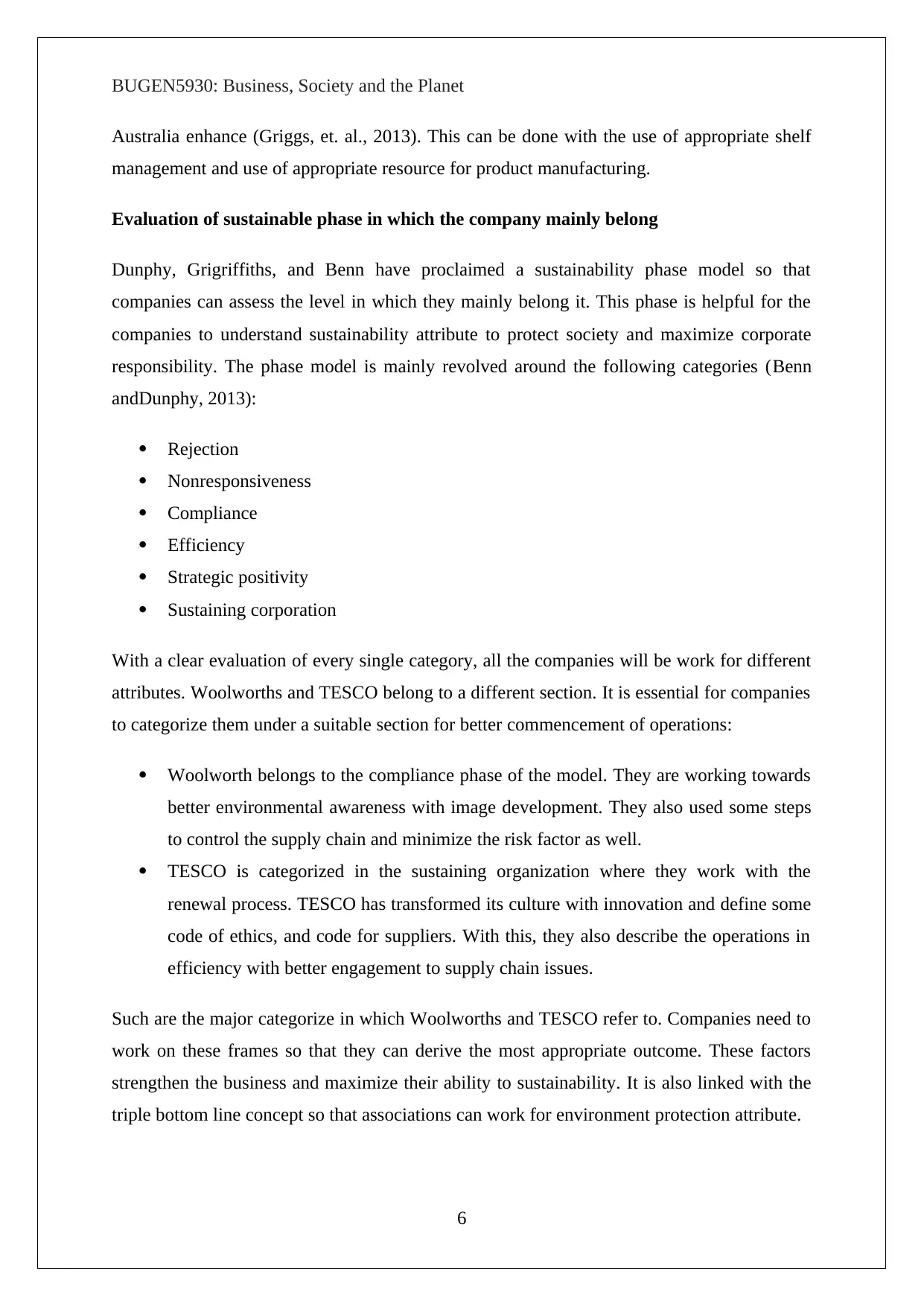
BUGEN5930: Business, Society and the Planet
Australia enhance (Griggs, et. al., 2013). This can be done with the use of appropriate shelf
management and use of appropriate resource for product manufacturing.
Evaluation of sustainable phase in which the company mainly belong
Dunphy, Grigriffiths, and Benn have proclaimed a sustainability phase model so that
companies can assess the level in which they mainly belong it. This phase is helpful for the
companies to understand sustainability attribute to protect society and maximize corporate
responsibility. The phase model is mainly revolved around the following categories (Benn
andDunphy, 2013):
Rejection
Nonresponsiveness
Compliance
Efficiency
Strategic positivity
Sustaining corporation
With a clear evaluation of every single category, all the companies will be work for different
attributes. Woolworths and TESCO belong to a different section. It is essential for companies
to categorize them under a suitable section for better commencement of operations:
Woolworth belongs to the compliance phase of the model. They are working towards
better environmental awareness with image development. They also used some steps
to control the supply chain and minimize the risk factor as well.
TESCO is categorized in the sustaining organization where they work with the
renewal process. TESCO has transformed its culture with innovation and define some
code of ethics, and code for suppliers. With this, they also describe the operations in
efficiency with better engagement to supply chain issues.
Such are the major categorize in which Woolworths and TESCO refer to. Companies need to
work on these frames so that they can derive the most appropriate outcome. These factors
strengthen the business and maximize their ability to sustainability. It is also linked with the
triple bottom line concept so that associations can work for environment protection attribute.
6
Australia enhance (Griggs, et. al., 2013). This can be done with the use of appropriate shelf
management and use of appropriate resource for product manufacturing.
Evaluation of sustainable phase in which the company mainly belong
Dunphy, Grigriffiths, and Benn have proclaimed a sustainability phase model so that
companies can assess the level in which they mainly belong it. This phase is helpful for the
companies to understand sustainability attribute to protect society and maximize corporate
responsibility. The phase model is mainly revolved around the following categories (Benn
andDunphy, 2013):
Rejection
Nonresponsiveness
Compliance
Efficiency
Strategic positivity
Sustaining corporation
With a clear evaluation of every single category, all the companies will be work for different
attributes. Woolworths and TESCO belong to a different section. It is essential for companies
to categorize them under a suitable section for better commencement of operations:
Woolworth belongs to the compliance phase of the model. They are working towards
better environmental awareness with image development. They also used some steps
to control the supply chain and minimize the risk factor as well.
TESCO is categorized in the sustaining organization where they work with the
renewal process. TESCO has transformed its culture with innovation and define some
code of ethics, and code for suppliers. With this, they also describe the operations in
efficiency with better engagement to supply chain issues.
Such are the major categorize in which Woolworths and TESCO refer to. Companies need to
work on these frames so that they can derive the most appropriate outcome. These factors
strengthen the business and maximize their ability to sustainability. It is also linked with the
triple bottom line concept so that associations can work for environment protection attribute.
6
⊘ This is a preview!⊘
Do you want full access?
Subscribe today to unlock all pages.

Trusted by 1+ million students worldwide
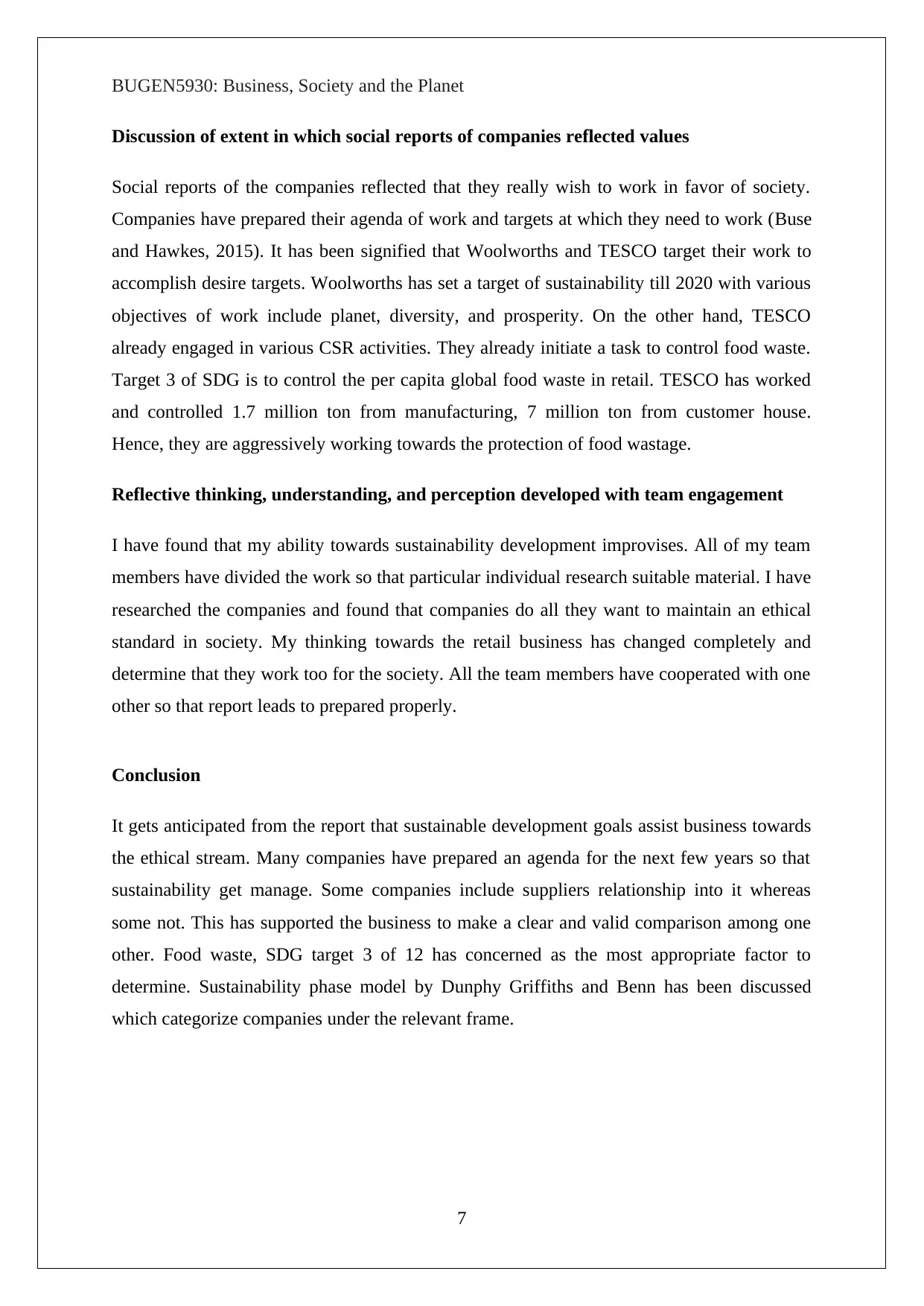
BUGEN5930: Business, Society and the Planet
Discussion of extent in which social reports of companies reflected values
Social reports of the companies reflected that they really wish to work in favor of society.
Companies have prepared their agenda of work and targets at which they need to work (Buse
and Hawkes, 2015). It has been signified that Woolworths and TESCO target their work to
accomplish desire targets. Woolworths has set a target of sustainability till 2020 with various
objectives of work include planet, diversity, and prosperity. On the other hand, TESCO
already engaged in various CSR activities. They already initiate a task to control food waste.
Target 3 of SDG is to control the per capita global food waste in retail. TESCO has worked
and controlled 1.7 million ton from manufacturing, 7 million ton from customer house.
Hence, they are aggressively working towards the protection of food wastage.
Reflective thinking, understanding, and perception developed with team engagement
I have found that my ability towards sustainability development improvises. All of my team
members have divided the work so that particular individual research suitable material. I have
researched the companies and found that companies do all they want to maintain an ethical
standard in society. My thinking towards the retail business has changed completely and
determine that they work too for the society. All the team members have cooperated with one
other so that report leads to prepared properly.
Conclusion
It gets anticipated from the report that sustainable development goals assist business towards
the ethical stream. Many companies have prepared an agenda for the next few years so that
sustainability get manage. Some companies include suppliers relationship into it whereas
some not. This has supported the business to make a clear and valid comparison among one
other. Food waste, SDG target 3 of 12 has concerned as the most appropriate factor to
determine. Sustainability phase model by Dunphy Griffiths and Benn has been discussed
which categorize companies under the relevant frame.
7
Discussion of extent in which social reports of companies reflected values
Social reports of the companies reflected that they really wish to work in favor of society.
Companies have prepared their agenda of work and targets at which they need to work (Buse
and Hawkes, 2015). It has been signified that Woolworths and TESCO target their work to
accomplish desire targets. Woolworths has set a target of sustainability till 2020 with various
objectives of work include planet, diversity, and prosperity. On the other hand, TESCO
already engaged in various CSR activities. They already initiate a task to control food waste.
Target 3 of SDG is to control the per capita global food waste in retail. TESCO has worked
and controlled 1.7 million ton from manufacturing, 7 million ton from customer house.
Hence, they are aggressively working towards the protection of food wastage.
Reflective thinking, understanding, and perception developed with team engagement
I have found that my ability towards sustainability development improvises. All of my team
members have divided the work so that particular individual research suitable material. I have
researched the companies and found that companies do all they want to maintain an ethical
standard in society. My thinking towards the retail business has changed completely and
determine that they work too for the society. All the team members have cooperated with one
other so that report leads to prepared properly.
Conclusion
It gets anticipated from the report that sustainable development goals assist business towards
the ethical stream. Many companies have prepared an agenda for the next few years so that
sustainability get manage. Some companies include suppliers relationship into it whereas
some not. This has supported the business to make a clear and valid comparison among one
other. Food waste, SDG target 3 of 12 has concerned as the most appropriate factor to
determine. Sustainability phase model by Dunphy Griffiths and Benn has been discussed
which categorize companies under the relevant frame.
7
Paraphrase This Document
Need a fresh take? Get an instant paraphrase of this document with our AI Paraphraser
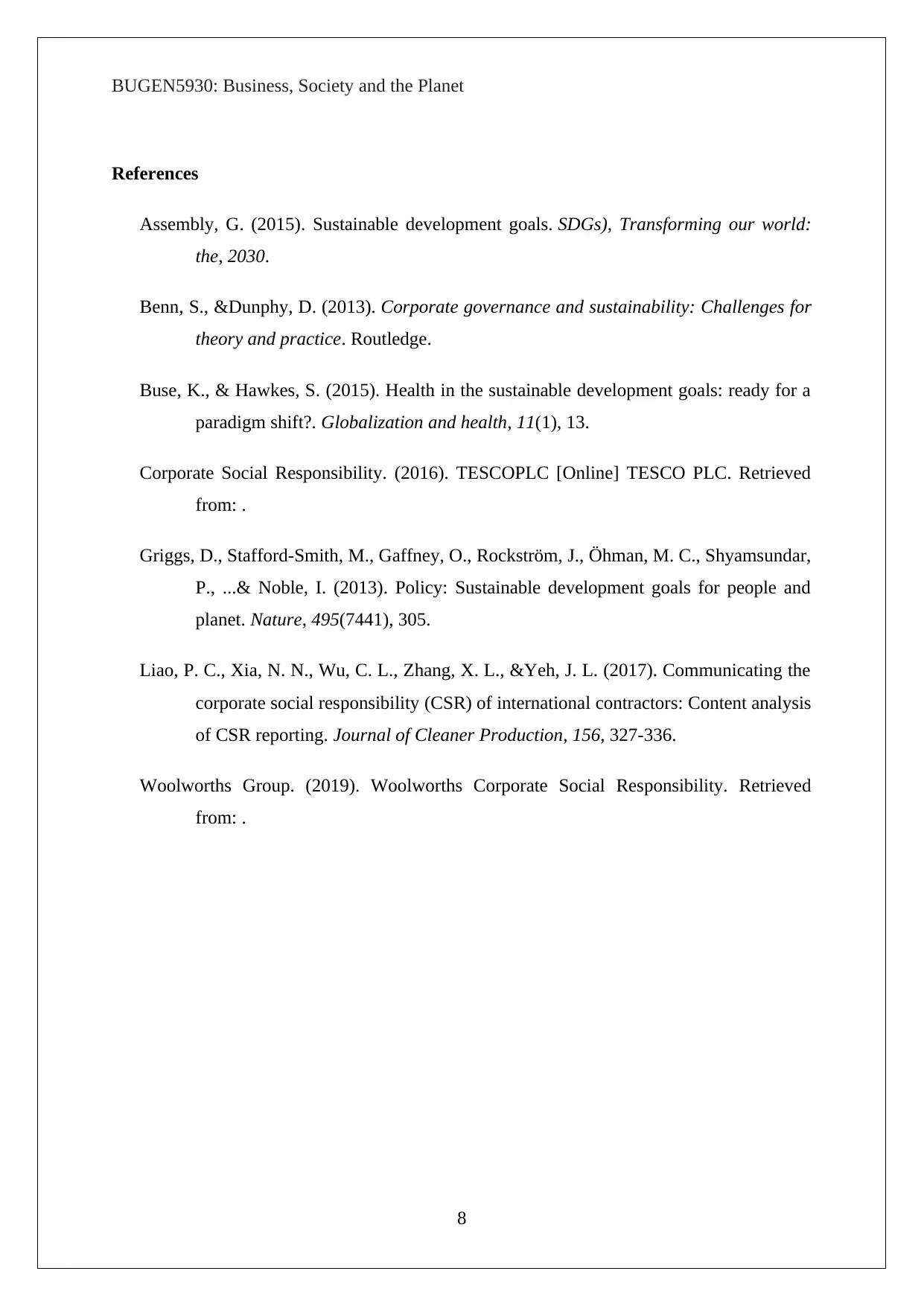
BUGEN5930: Business, Society and the Planet
References
Assembly, G. (2015). Sustainable development goals. SDGs), Transforming our world:
the, 2030.
Benn, S., &Dunphy, D. (2013). Corporate governance and sustainability: Challenges for
theory and practice. Routledge.
Buse, K., & Hawkes, S. (2015). Health in the sustainable development goals: ready for a
paradigm shift?. Globalization and health, 11(1), 13.
Corporate Social Responsibility. (2016). TESCOPLC [Online] TESCO PLC. Retrieved
from: .
Griggs, D., Stafford-Smith, M., Gaffney, O., Rockström, J., Öhman, M. C., Shyamsundar,
P., ...& Noble, I. (2013). Policy: Sustainable development goals for people and
planet. Nature, 495(7441), 305.
Liao, P. C., Xia, N. N., Wu, C. L., Zhang, X. L., &Yeh, J. L. (2017). Communicating the
corporate social responsibility (CSR) of international contractors: Content analysis
of CSR reporting. Journal of Cleaner Production, 156, 327-336.
Woolworths Group. (2019). Woolworths Corporate Social Responsibility. Retrieved
from: .
8
References
Assembly, G. (2015). Sustainable development goals. SDGs), Transforming our world:
the, 2030.
Benn, S., &Dunphy, D. (2013). Corporate governance and sustainability: Challenges for
theory and practice. Routledge.
Buse, K., & Hawkes, S. (2015). Health in the sustainable development goals: ready for a
paradigm shift?. Globalization and health, 11(1), 13.
Corporate Social Responsibility. (2016). TESCOPLC [Online] TESCO PLC. Retrieved
from: .
Griggs, D., Stafford-Smith, M., Gaffney, O., Rockström, J., Öhman, M. C., Shyamsundar,
P., ...& Noble, I. (2013). Policy: Sustainable development goals for people and
planet. Nature, 495(7441), 305.
Liao, P. C., Xia, N. N., Wu, C. L., Zhang, X. L., &Yeh, J. L. (2017). Communicating the
corporate social responsibility (CSR) of international contractors: Content analysis
of CSR reporting. Journal of Cleaner Production, 156, 327-336.
Woolworths Group. (2019). Woolworths Corporate Social Responsibility. Retrieved
from: .
8
1 out of 8
Related Documents
Your All-in-One AI-Powered Toolkit for Academic Success.
+13062052269
info@desklib.com
Available 24*7 on WhatsApp / Email
![[object Object]](/_next/static/media/star-bottom.7253800d.svg)
Unlock your academic potential
Copyright © 2020–2026 A2Z Services. All Rights Reserved. Developed and managed by ZUCOL.





